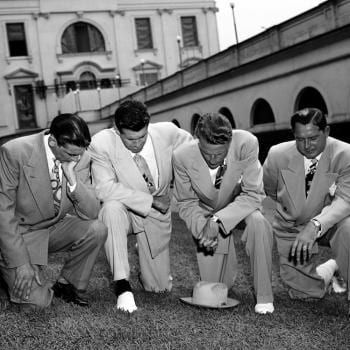Chris Gehrz makes a case for historians producing podcasts as a way of reaching a larger audience and so bringing the fruits of historical knowledge to public debates. He has in mind Max Boot’s recent argument that debates about foreign policy have suffered because historians have abandoned scholarship for general audiences in favor of specialized, overly precise, books that no one except trained historians and graduate students will read. We are back to a distribution problem — how scholars reach beyond campus and research libraries to people who read newspapers or listen to the radio. Gehrz thinks social media is one remedy. He recommends four different shows that feature academic historians who mix it up on a variety of topics and adds his own where he talks with a colleague:
But knowing that more than a few of our peers instinctively sneer at “sportsball,” we’re committed to taking seriously the study of sports: on their own terms, and as a way of helping listeners (and eventually our students) ask fundamental questions about faith, politics, society, culture, and the economy.
John Fea, who has created successfully a social media platform that has increased the visibility of his recent book on evangelicals and Donald Trump (dedicated to me, by the way, since I did not vote for POTUS), agrees with Gehrz about the potential of podcasts:
Over at The Anxious Bench, Chris Gehrz reminds us that podcasts are just another way in which historians are connecting to public audiences.
John Turner pushed back a bit by encouraging academic historians to do what they do best — teach academic history (hey now!):
call me old-fashioned, but I think by far the most important audience to which the vast majority of historians speak is our students. If we prepare well for our classes, engage students, teach them to think historically, and serve as mentors and advisers as they advance toward graduation, then we’re doing what the vast majority of taxpayers and parents would want.
In addition to the question of staying in your lane, another problem is that anyone with a computer can start a blog or a podcast. Instead of giving you access to larger audiences, starting a publication or production on the Internet is a bit like going from one line at the Department of Motor Vehicles — the one for car registration — to another — the one for a driver’s license.
Starting a podcast is like taking a number. Gehrz concedes this:
If anything, the problem isn’t that too few historians are engaging with the public. The problem is helping a public overwhelmed with media choices find their way to the historians.
The question then is how to select from all the channels that are out there. Back in the early days of cable tv a common complaint was that the service provided too many options and made it impossible to see all the important or popular shows. Netflix and Amazon only compound the problem that viewers face. And now historians want us to add them to a day that still has only 24 hours.
Just yesterday morning, for instance, I listened to a very good exchange between Washington Post film critic, Ann Hornaday, and Federalist reporters, Emily Jashinsky, about the Oscars. I am betting that this episode has had more downloads than your average historian’s podcast. The reason has little do with intelligence and training. And I only opened this episode by avoiding the podcasts I prefer to listen to, both at Bloggingheadstv.com, The Glenn Show with Glenn Loury and the Wright Show with Robert Wright, the former an economist and the latter a journalist. Historians with Ph.D.s have more advanced training and expertise than either of the women on the Federalist Radio Hour and Wright (hard to match Glenn Loury’s academic accomplishments). Hornaday is a veteran film critic at the Post and Jashinsky is a young reporter not that long out of college. Hornaday didn’t even study film and admits that she is still catching up on the canon of American cinema from Hollywood’s golden age.
What makes many podcasts more appealing is that the contributors like Hornaday, Jashinksy, and Wright already occupy a bigger platform than most professors. Journalists receive more attention than historians because whenever a reporter writes they do so for thousands (if not millions) more people than any professor. Even your most successful book as a historian will not reach as many people who read national newspapers or follow news outlets on-line. Plus, a professor is blessed if he or she can produce a book each year. Journalists, in contrast, are contacting their readers multiple times each week.
By the way, Glenn Loury does not do a podcast about economics. His subject is often race (with John McWhorter) or public policy (he was at Harvard’s Kennedy School of Government early in his career).
Of course, it’s not fair that people with more expertise have smaller audiences. But that is the architecture of ideas in modern society. Mass media (and related Internet platforms) by nature reach mass audiences. Professors may think they have a lot to say to those same readers and listeners — and they do — but their own institutions, credentials, appointments, and professional standards do not matter for mass market purposes the way that newspapers and magazines do. It’s like thinking the dog house you built for your backyard, with quality materials and masterful design, deserves to be recognized for its quality the way people like the local Kroger supermarket (and pay no attention to its design or beauty). Chances are, the dog house builder would find the crowds that Kroger handles a bit difficult to manage (not to mention a bit upsetting to neighbors).












